
PI-IBS
PI-IBS, or post-infectious IBS, refers to the approximately 10% of people who develop IBS after a stomach illness or infection in the gastrointestinal tract. The stomach never fully recovers, and symptoms persist, sometimes for 6-7 years. Research shows that the interaction between the immune system and gut bacteria is altered in people with PI-IBS, and after the infection, the immune system reacts incorrectly to bacteria that naturally occur in the gut.
The first cases of PI-IBS were noticed during World War II when British soldiers returned after suffering from bacterial dysentery and later developed IBS-like symptoms. More recently, similar cases have been reported after people contracted Campylobacter, Salmonella, and Shigella infections, typically after consuming contaminated food or water or being infected by other people or animals. After a bacterial gastrointestinal infection, the risk of developing IBS increases. Most people develop IBS-D (diarrhea) or IBS-M (mixed bowel habits). It is less common to develop IBS-C (constipation).
What causes PI-IBS?
The cause is thought to be the body’s inability to properly turn off the inflammatory process that occurs when foreign bacteria enter the body. A low-grade inflammation persists for several years and develops into IBS.
The longer and more severe the initial infection, the greater the risk of developing PI-IBS. The bacteria’s ability to produce toxins also plays a role. Factors such as gender, age, and psychological aspects of the affected individual are important. There is also suspicion that a genetic factor may be involved.
Many of those affected may eventually recover from PI-IBS without specific treatment, but it can take several years. A previously published study in the journal “Gut” (2010) showed that PI-IBS symptoms persisted 8 years after waterborne dysentery.
Take control over your IBS today!
Study about PI-IBS at Örebro University
Microbe-Host Interactions in Post-Infectious Irritable Bowel Syndrome (PI-IBS) by Jan Brummer is a study conducted at Örebro University. The aim of the study is to identify the causes of PI-IBS and subsequently develop preventive and curative measures for patients affected by the condition.
The hypothesis of the study is that the initial infection disrupts the balance between the patient’s immune system and the naturally occurring bacteria in the gut. The study has shown that gut bacteria have many immunoregulatory functions. They stabilize the epithelial barrier, which forms the boundary between the gut and the body’s tissues, and stimulate T-cells that have anti-inflammatory effects and regulate our immune response.
A disrupted leakage of the epithelium, whose cells are connected by tight junctions, could be a potential explanation for the altered immune response. Therefore, further investigation will now examine whether increased permeability could be due to changes in the behavior of proteins that bind epithelial cells together.
Almost one-third of all Swedes suffer from IBS at some point. PI-IBS can occur, for example, after experiencing stomach issues on vacation, following a holiday meal, or when water becomes contaminated. The Örebro studies show clear physiological changes in the gut and a link between stress and PI-IBS.
The Örebro study is unique because the researchers took samples from untreated intestines and compared samples from the intestinal mucosa with stool samples. The gut flora of patients with PI-IBS was found to differ not only from that of healthy participants but also from other IBS patients.
Sofia Antonsson
Reg. Dietitian, Belly Balance
Read more about

Diarrhoea and loose stools
Diarrhoea is defined as having more than three thin and watery bowel movements per day. There can be several reasons for experiencing diarrhoea. One reason might be an overly active bowel, which can sometimes affect individuals with IBS.

New positive study on yoga and IBS

Gluten
In recent years, several articles have emerged discussing whether we should consume gluten or not and whether it is gluten or FODMAPs that is the culprit for digestive issues. Some experts caution against eliminating gluten from the diet, while others argue that gluten itself can lead to a variety of symptoms and diseases, with digestive problems being just one of them.

